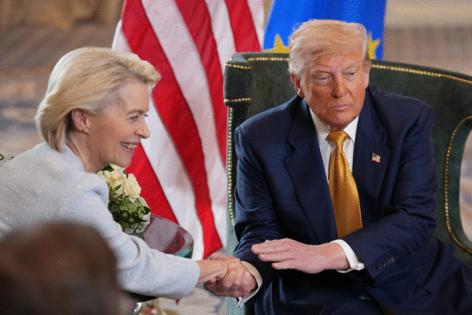Harsh reality of US trade deal stirs EU soul-searching over lost clout
Published in News & Features
As European Union leaders work through the consequences of their new trading arrangement with the U.S., they are confronting the bitter reality of just how far they have fallen.
Donald Trump held court on Sunday at one of the golf courses he owns on the Scottish coast, touting the new ballroom he’d had built at the clubhouse and delivering a lengthy tirade on the problems with wind turbines. European Commission chief Ursula von der Leyen had to wait until the U.S. president had finished his round for the day before she got her chance to discuss the transatlantic trade relationship.
But the terms of that deal will mean a significant hit to European companies —- the EU accepted a tripling of tariffs to 15% on most exports to the U.S. and will keep its own levies on imports from the world’s biggest economy to 1% or less.
“Economically, this isn’t a good agreement and geopolitically speaking, it is a defeat,” former Spanish Foreign Minister Arancha Gonzalez Laya, now the dean of the Paris School of International Affairs at Sciences Po, told Bloomberg. “This agreement makes the EU smaller.”
European ambassadors meeting in Brussels on Monday recognized that von der Leyen had no choice but to swallow such an unbalanced deal because the alternatives would have been worse, according to people familiar with their discussions.
Retaliating against Trump’s tariffs wouldn’t just have risked a trade war that the bloc’s fragile governments can ill afford, it would have jeopardized the supply of U.S. LNG that helped stabilize European energy prices since Russia’s invasion of Ukraine and perhaps even U.S. support for the security of Europe.
“It was not only about trade,” EU Commissioner Maros Sefcovic, who led the negotiations with the Trump administration, told reporters on Monday.
Trump’s power play laid bare the strategic costs for the EU of outsourcing its long-term security to the U.S. for decades on the assumption that it would always have a more-or-less benign partner in the White House.
The deal will force EU officials to reconsider their place in the global pecking order, one senior EU diplomat said. Although the EU may consider itself a trade superpower, the weekend’s outcome shows that’s no longer enough to defend its interests at a time when geopolitical rivals are prepared to use other forms of leverage, the diplomat added.
Chancellor Friedrich Merz said the European economy will suffer “significant damage” while French Prime Minister Francois Bayrou called it “a dark day.” Von der Leyen herself said the deal was “the best we could get.”
Even with those unpalatable terms, the EU may struggle to deliver on its new commitments to the U.S.
The EU executive has promised that European companies will procure $750 billion of energy products from U.S. over the next three years and touted additional investments worth $600 billion, although the details of the agreement are still being finalized.
The EU imported $80 billion of U.S. energy products last year and total U.S. energy exports were just $330 billion. Nevertheless, Sefcovic said he thinks the pledge is “achievable.”
The EU’s capitulation on trade came shortly after the bloc’s NATO members had bent over backward to keep Trump committed to the alliance at a summit in The Hague in June. At that gathering, NATO members (with the exception of Spain) pledged to raise military and related spending to 5% of GDP to address Trump’s longstanding complaints about EU countries neglecting investment in their own defenses.
Trump has also increased pressure on Vladimir Putin in recent days, setting a deadline for the Russian president to agree to a ceasefire and promising new supplies of weapons, including Patriot missiles, to Kyiv. A major trade spat between the EU and the U.S. could have put all that this much-needed backing at risk, EU diplomats feared.
While conventional diplomacy has tended to keep issues like trade and security on separate tracks, the U.S. leader is known for using trade as leverage on other issues. He used tariffs to punish Brazil over Jair Bolsonaro’s judicial case, to pressure Mexico over immigration and to demand China do more to combat fentanyl production.
In European capitals, the fallout from the trade deal will add to the urgency of plans to revive the EU’s geopolitical muscle.
European nations are accelerating a rearmament program to compensate for the underinvestment in military seen over decades and is cementing ties with partners around the world using a myriad of agreements, from defense and digital partnerships to trade deals. The European Commission is also spearheading a new attempt to lower the internal barriers of the European market from financial services to energy, defense and telecoms, in a bid to increase the dynamismof the single market.
“I draw one conclusion from the last few weeks: we must become stronger as the EU, focus on our own strengths, work to strengthen the European single market, and ensure that the 27 European nation states work more closely together,” said German Finance Minister Lars Klingbeil.
—With assistance from Milda Seputyte.
©2025 Bloomberg L.P. Visit bloomberg.com. Distributed by Tribune Content Agency, LLC.







Comments